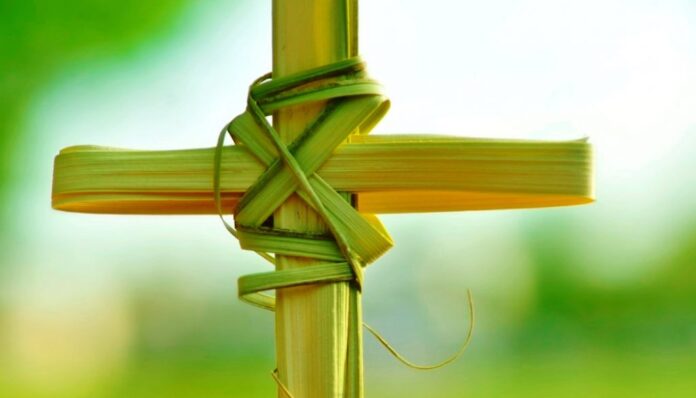The Easter Season is fast approaching, marked by Palm Sunday this coming weekend, March 24th. This article will cover Easter as a religious holiday and the significance of the Holy Week of Easter in Christian religions. In Western Christianity, including Roman Catholicism, Eastern Orthodox Christianity and Protestant denominations, the period prior to Easter holds special significance.
For most Christian churches, the preparation for Easter begins with Lent, a period of fasting and penitence and religious observance commemorating the 40 days Jesus fasted in the desert and endured temptations by Satan before beginning his public ministry. Lent begins on Ash Wednesday and ends the night before Good Friday on Maundy Thursday, also called Holy Thursday. Maundy Thursday marks both the washing of the Apostle’s feet and the Last Supper Jesus had with the Apostles.
In Eastern Orthodox Christianity, Easter rituals start with the Great Lent, which begins on Clean Monday (40 days prior to Easter, not including Sundays). The last week of Great Lent is referred to as Palm Week and it ends with Lazarus Saturday, the day before Palm Sunday. Palm Sunday marks the beginning of Holy week which ends on Easter Day.
For most other Christian churches, the Holy Week of Easter Week, which concludes the “Passion of Christ”, begins with Palm Sunday, marking Jesus’ entrance into Jerusalem when his followers laid palm leaves across the road to greet him. Good Friday of that week commemorates the crucifixion of Jesus. According to the New Testament, Jesus was arrested by the Roman authorities because he claimed to be the “Son of God.” Some historians say they believe the essential reason he was crucified was because the Romans felt both he and his followers were a threat to the Roman Empire. Jesus was sentenced to death by Pontius Pilate, the Roman prefect in the province of Judea from 26 to 36 A.D. Jesus death by crucifixion, thought to have been in 30 A.D., is marked by the Christian holiday Good Friday. Many Churches begin the Easter observances in the late hours of the day before (Holy Saturday) in a religious service called the Easter Vigil. States like New Jersey, Connecticut and Texas have named Good Friday as a state holiday, but it has not been designated as a federal holiday.
In most Christian religions, Easter Day, celebrating the resurrection of Jesus, always falls on a Sunday between March 22 and April 25, falling on March 31st this year. It typically falls on the first Sunday after the first full moon occurring on or after the spring equinox. In Eastern Orthodox Christianity, Orthodox Easter falls on a Sunday between April 4 and May 8 each year. Their Easter Sunday serves as the start of the season of Pascha (Greek for Passover), which ends 40 days later with the holiday known as the Feast of the Ascension. In some denominations of Protestant Christianity, Easter Sunday marks the beginning of Eastertide or the Easter Season. Eastertide ends on the 50th day after Easter, which is known as Pentecost Sunday. This year Palm Sunday is March 24th, Good Friday is March 29th, Easter is March 31st and Passover begins on April 22nd.
Many churches and many Easter services are held at dawn on Easter morning. It is said Mary opened Jesus’s tomb at dawn on Easter morning to find it empty. In honor of this occasion, many churches hold their service at sunrise so parishioners can experience this special day beginning with the sunrise.
The first recorded sunrise service was held in 1732 in Saxony, now Germany, when a group of young men from a local church held an early morning ceremony on an Easter Sunday. The next year, the entire congregation of the church joined the young men at sunrise on Easter Sunday and a tradition was born with word spreading throughout Saxony (Germany). By 1773, German immigrants brought this tradition with them to America. The first sunrise service in the U.S. was held in Winston-Salem, North Carolina.
Easter is also associated with the Jewish holiday of Passover as well as the exodus of the Jews from Egypt as described in the Old Testament. Although the observances and celebrations are different there are links through the Last Supper Jesus had with his Apostles, said by some to essentially be a Passover Feast. The Last Supper meal is said to have consisted of matzah (bread) and wine. Holy Communion identifies the body of Jesus as represented by the bread and the wine as representing the blood of Jesus. All of these representing the sacrifice Jesus was about to make with his death and becoming the Christian ritual of Holy Communion and a fundamental part of Christian religious services.
Regardless of your religious belief or how these weeks and days may be celebrated by your beliefs, use these days as a time of contemplation and reflection, a time to enjoy family, a time to celebrate in your own way. Above all, have a Happy, Safe and Peaceful Easter.



















